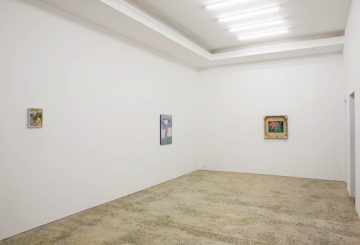We were saddened to hear that Australian film director Tim Burstall had suffered a stroke while watching a retrospective of his films in Melbourne. He died the next morning after being rushed to hospital, age 76. A significant figure in the emerging Australian cinema of the late 1960s and early 1970s, he directed Alvin Purple (a sex comedy starring Graeme Blundell, and the first Aussie film to get distribution in the US) and Petersen, a Jack Thompson ‘vehicle’.
Burstall also had a few relationships with the non-cinematic visual arts – he was famously the subject of a portrait by artist John Bloomfield, who won the Archibald Prize for Portraiture and then had it taken away again when it was discovered he’d painted it from a photo in a magazine and Burstall didn’t know anything about it. To the director’s credit, he supported Bloomfield, but rules are rules and aren’t meant to be broken, are they?
Burstall’s other interesting association with Australian art was that he sold two of his Arthur Boyd paintings to help finance his second feature, Stork (1971) starring Bruce Spence, based on a play by David Williamson (back in the days when people gave a shit about Williamson). As David Stratton described the film in his book The Last New Wave: The Australian Film Revival;
“For most of its length, Stork is an enjoyably ribald comedy carried along by the smart dialogue and the splendid performances. Williamson and Burstall have captured perfectly Carlton in the early seventies, the days of Sir Henry Bolte and anti-Vietnam, anti-apartheid demonstrations. Bruce Spence’s Stork is a magnificent creation, showing his contempt for the system […] ruining his chances with a prospective employer as, over a smart lunch, he confides that “I couldn’t manage me bowel movements till I was five “, or disrupting a snooty art gallery opening by a revolting trick with an oyster stuffed up his nostril.”
There’s quite a bit of broad satire in Stork, especially as much of the film is concerned with the Australian art scene. Our favourite memory of the movie was Stork’s fleeting career as a painter and his invention of “chunder art” where, after a few long necks of beer and some ripe cheese, he bellows the contents of his stomach on to a canvas, to the great appreciation of the foolish art world people who’d accept anything as “art”. It’s also worth noting that Stork was also a huge financial and critical success. Adios Tim Burstall.

